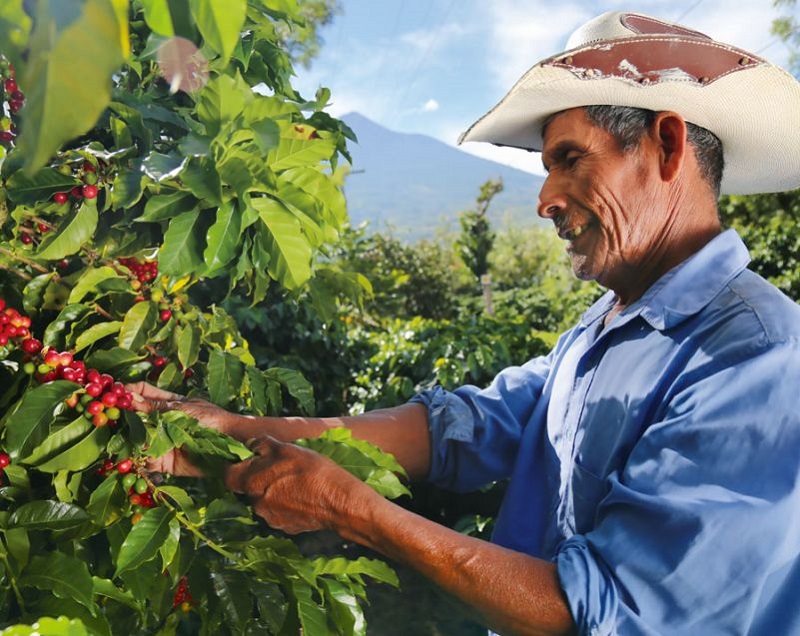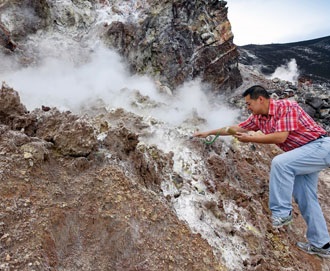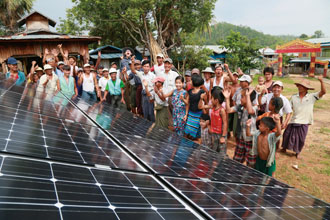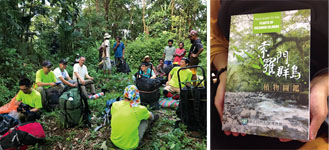
The Regional Lending Program for Coffee Rust in Central America is in place to help small coffee growers restore production capacity in the wake of a devastating fungal outbreak. (Photo courtesy of International Cooperation and Development Fund)
Taiwan’s foremost foreign aid organization bolsters sustainable development in diplomatic allies and like-minded nations through a range of environmental initiatives.
When Lin Ping-cheng (林秉正) graduated from National Cheng Kung University in southern Taiwan’s Tainan City in August 2002, he decided to travel abroad for a year to experience different cultures before entering the workforce. Within a month, Lin had set off for Central America to volunteer with Taipei City-based International Cooperation and Development Fund (TaiwanICDF), the country’s foremost foreign aid organization. With his background in computer science and information engineering, he was assigned to establish, monitor and maintain information technology systems and services in rural schools.
More than 15 years have passed and Lin is still striving to improve lives in Central America. As one of TaiwanICDF’s top technicians, he has worked in Republic of China (Taiwan) diplomatic allies such as Guatemala, Honduras and Nicaragua. He is currently stationed in El Salvador as head of a capacity enhancement project focused on applying geographic information systems (GIS) technology, which gathers and analyzes topographical data.
“Our partner nations in Central America face high risks from natural disasters,” Lin said, adding that the problem is exacerbated by deficiencies in land management. Because of this, the main components of the project include the utilization of GIS and similar technologies for land-use planning, environmental management and educational training, he explained.
|
|
In the last three years, TaiwanICDF-initiated technical cooperation projects have helped El Salvador, Honduras and Nicaragua monitor over 300,000 square kilometers of land including nature reserves and woodlands via satellite, resulting in 17 analysis reports following emergencies such as earthquakes, floods, forest fires, insect and plant disease outbreaks, and landslides, according to Lin. In addition, nearly 400 local participants have attended GIS training courses delivered by the agency.
“The use of GIS in disaster management has allowed Central American governments to develop appropriate mitigation, preparedness, response and recovery measures, drastically reducing loss of life and property damage,” Lin said. “Knowing our initiatives offer substantive assistance keeps me motivated and passionate about my work.”
Climate of Change
Since its establishment in 1996, TaiwanICDF has implemented foreign aid projects in areas including technical cooperation, human resources development, humanitarian assistance, lending and investment as well as youth services. In recent years, the agency has undertaken a series of reforms aimed at bringing its practices in line with contemporary international development assistance norms, according to Timothy T. Y. Hsiang (項恬毅), the organization’s secretary-general.
“We’ve incorporated the U.N. Sustainable Development Goals into our strategic plans to assist partner nations in mitigating and adapting to the effects of climate change, developing renewable energy sources and reducing pollution,” Hsiang said. “The aim is to promote inclusive economic growth while ensuring environmental sustainability.” Taiwan’s abundant expertise and well-developed GIS, satellite, green energy and recycling technologies are being put to good use in supporting sustainable practices, he added.
Environmental projects launched by TaiwanICDF over the years include GIS capacity enhancement in Central America, census and classification of plant resources in the Solomon Islands and green energy projects in the Marshall Islands—both diplomatic allies—and Myanmar.
|
|
“The assistance operations in the Marshall Islands and Myanmar, for example, are in place to deliver clean energy solutions via financing and the provision of new technology,” Hsiang said. His agency offers low-interest loans to residents of the Pacific island nation that can be used to purchase energy-saving home appliances, install solar panels and replace old electrical wiring. In Myanmar, the organization sets up solar power stations and minigrids in remote villages to provide inhabitants with affordable and reliable electricity.
Expanding Cooperation
In 2011, TaiwanICDF expanded its operations in Europe and the Middle East when it partnered with the European Bank for Reconstruction and Development to improve energy efficiency in developing countries. The projects involved financing the introduction of smart metering in Bosnia and Herzegovina, as well as a landfill gas recovery system in Jordan that helps reduce the nation’s energy imports.
The following year a devastating fungal infection known as coffee leaf rust ravaged the coffee industry in Central America. TaiwanICDF teamed up with the Central American Bank for Economic Integration to help tackle the problem, establishing the Regional Lending Program for Coffee Rust in Central America, which provides loans to small coffee growers so they can restore production capacity.
Best Efforts Made Better
To increase the effectiveness of its projects, TaiwanICDF integrates resources from the nation’s academic and research sectors, Hsiang said. For instance, the botanical research initiative implemented in the Solomon Islands from 2012 to 2017 was aided by experts from the National Museum of Natural Science (NMNS) in central Taiwan’s Taichung City as well as the Dr. Cecilia Koo Botanic Conservation Center (KBCC) based in the southern county of Pingtung.
Aleck Yang (楊宗愈), a researcher at NMNS, was the project’s executive secretary and visited the South Pacific nation more than 10 times alongside other Taiwan botanists during the implementation period. “The Solomon Islands is home to an estimated 7,000 or more species of vascular plants. However, over the last decade vast areas of native forests were logged to provide timber for export and make way for cash crops like cocoa and palm oil,” he noted. “As a result, indigenous species are under threat and many face extinction.”
|
|
Together with workers from the Solomon Islands Ministry of Forestry and Research, experts from Taiwan carried out comprehensive flora conservation work. They collected and documented plant resources, built greenhouses, organized training workshops and published botanical illustrations. Living samples were sent back to KBCC for ex situ conservation.
“Once a species is lost, it’s gone forever, so there is an urgent need to study and preserve plant life,” Yang said. “Hopefully our efforts can raise awareness about the importance of biodiversity and conservation and reduce deforestation in the Solomon Islands.” The NMNS researcher expressed hope that TaiwanICDF and his institution can begin a new project focusing on the uses and economic potential of indigenous plant species.
Altruistic Actions
In addition to utilizing the expertise of local institutions, the agency also enlists the help of individuals via the TaiwanICDF Overseas Volunteers Service. Since 1996, more than 700 local volunteers have traveled the world to facilitate economic growth and social development in partner countries through such efforts as the recently concluded dry forest conservation project in Nicaragua. Jane Lin (林淑娟), who graduated with a bachelor’s degree in life sciences from National Chung Hsing University in Taichung, spent nearly all of 2016 working in the botanical garden at National Autonomous University of Nicaragua in Leon.
The mission at Leon Botanical Garden, she said, was to protect the local forest ecosystem by promoting outdoor activities and environmental stewardship through education, research and interaction with nature. Lin was engaged in environmental education, plant collection and seedling cultivation. She also took part in field work, gave guided tours of the garden and planned environmental activities for students from nearby schools.
According to Lin, volunteering abroad with TaiwanICDF gave her a unique experience that blended learning, living, working and service. “It was a great opportunity to apply the skills I’d learned at university relating to biology, plant physiology and tissue culture cultivation in the real world,” she said. “I was glad to contribute to environmental conservation on a deep and meaningful level, while at the same time learning about the benefits of a simple life.”











